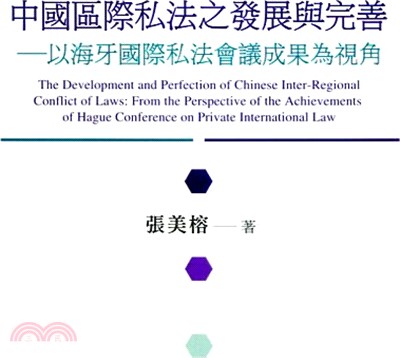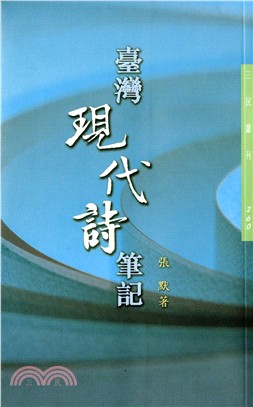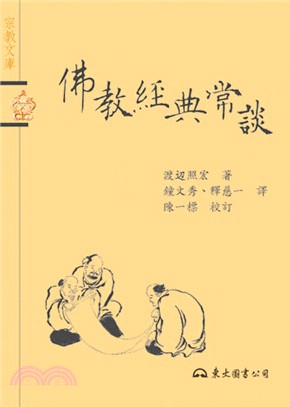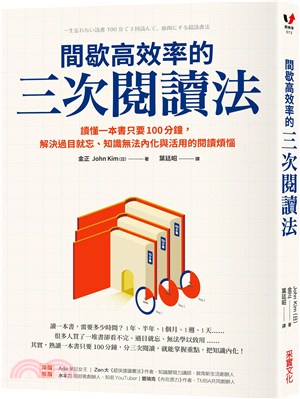商品簡介
作者簡介
張美榕
中國社會科學院大學政法學院副教授,中國社會科學院國際法所博士後研究人員(2011-2014),中南財經政法大學法學博士(2008-2011)。曾訪學於荷蘭海牙國際法學院國際法與國際關係研究中心(2014)、臺灣中央研究院法律學研究所(2013)、德國馬克斯.普郎克學會比較法與國際私法研究所(2012)、香港大學法學院(2010)以及臺灣東吳大學法學院(2009)等。主要研究方向為國際私法、區際私法。
名人/編輯推薦
推薦序
認識美榕十多年了,真心喜歡她的性情。她以有些天真的單純和善良看待世界,卻又有著敏感、細緻和安靜的成熟,對她自己的專業有一種近乎虔誠的專注和專一,心無雜念地熱愛、學習和研究了國際私法十多年,而且應該還會繼續下去。和她相識、相交,成為她亦師亦友的精神上的知心人和專業上的同行者,是我的幸運。
自香港和澳門回歸以來,中國的區際法律衝突和區際私法的完善就一直是國際私法領域的熱點問題,已有不少針對這一問題的研究成果。我和美榕也都對此問題有興趣。美榕對中國區際私法的研究已有很多年,在與我合作進行博士後研究期間,她就開始將中國區際私法的建設和完善與海牙國際私法會議成果相聯繫,試圖從中尋獲推促中國區際私法前行的途徑。這是一個比較特別的思路。
香港和澳門回歸以及中國大陸開放和臺灣民商交往已20年左右,但存在於海峽兩岸暨香港、澳門各法域之間的區際法律衝突的解決以及區際私法的建設和完善卻進程緩慢。「求同存異」是調整中國區際法律衝突問題的最可行方法,海牙國際私法會議的成果即為四個法域奠定了一定的「求同」基礎。
海牙國際私法會議作為當今國際社會最具影響力的統一國際私法的機構,其大量成果對各國國際私法法規的制定都有著很大影響。中國內地與香港和澳門所參加的海牙國際私法公約有相同的,也有不相同的,其中的幾個公約可共同適用於三個法域,這些公約雖不能用於調整三個法域之間的區際法律衝突,但卻是三個法域協商制定區際民商事安排的重要參考。臺灣雖然沒有參加海牙國際私法會議公約,但臺灣在制定國際私法法規時也廣泛參考和借鑑了海牙國際私法會議公約的內容。這是四個法域「求同」的良好基礎,或許可以借此基礎推促中國區際私法的發展。
美榕的這本書是一個有益的嘗試,她很用心地完成了這次嘗試。她的認真和創見使這本書具有了相當好的意義,有著獨特的價值。
在此書即將出版之際,我很高興得到美榕的信任,獲得為此書寫序的殊榮。在十多年的時間裡,我看到了美榕每一點進步,為她能有今天的收穫感到欣慰。相信這本書既是她勤奮治學的結晶,也是她繼續前行的新起點。
此序為美榕助力,與美榕共勉。希望我們一直是知心人和同行者。
沈 涓
於京北郊天頤尚居
2018年10月12日
推薦序
本書是作者張美榕教授對海峽兩岸暨香港、澳門之間的區際私法,進行多年研究的成果。目前中國的區際私法,是指臺灣、中國大陸、香港、澳門等四個法域之間的法律衝突。這四個法域所屬的法系不盡相同,社會制度歧異甚大,在法域平等的基礎上,區際私法屬於各法域的「域內法」事項,各法域都自謀其域內區際私法的解決方案。
區際私法對兩岸的四個法域而言,都是最近二、三十年的新鮮事。但香港及澳門原有制度「不變」的50年,承諾的期間只剩30年左右,究竟還有多少區際私法空間,出現無法精確預測的不安及疑慮。各法域的法制仍在演變之中,其變化使學者很難完全掌握單一法域的法制發展,作者要同時對這四個法域的區際私法進行比較研究,直接挑戰更高難度的領域,其研究熱情及膽識令人佩服。她在四個法域之外,加入海牙國際私法會議的相關公約,各問題的比較分析乃更加複雜,所幸,她曾在香港、臺灣及海牙研習,其經驗及體會都融入在這五個法制的描繪之中,使本書的內容及筆調,少了對於外法域的生澀,也增加了本書的可讀性。
本書討論的面向很廣,就區際法律衝突的重要問題,都對兩岸四個法域及海牙公約的規則提出說明,並予以比較分析。本書討論的許多問題都涉及倫理價值及技術安排,在法學界百家爭鳴的年代裡,我不會鄉愿地說作者已經整合各家見解並提出最權威的結論,但我相信讀者會看到她的努力。
本書作者從人文的角度出發,呼應已經在政治上被提出的「人類命運共同體思想」,認為區際私法應實現「人類命運共同體共同福祉」,海峽兩岸暨香港、澳門人民及其相互之間的民商事關係,「應在平等與愛的基礎上得到更多法律層面的尊重與保障」,並從海牙國際私法公約提煉出「人類美好的核心價值」,呼籲建立「充滿幸福、慈愛和理解的永久的家」,以保護「兒童最大利益」。作者屬年輕一輩,卻能以人類共同福祉為念,強調法域平等,著書立說,值得肯定。
海峽兩岸暨香港、澳門的法律衝突,無論我們喜歡與否,都不能否認它是中國近代歷史的結晶。我和本書作者分屬臺海兩岸,區際私法和國際私法是我們共同的研究領域,結緣多年,也一直被她尊稱為老師。今蒙邀序言,感念彼此緣份甚深,特撰數語為序,也獻給生命的共同光點。
臺北大學終身榮譽特聘教授
陳榮傳
謹識於2018年臺灣光復節前夕
Preface
Mainland China, Hong Kong Special Administrative Region (SAR), Macao SAR and Taiwan not only all have their own systems of substantive civil, commercial and procedural law, they also have their own rules of private international law or conflict of laws. As a result, each region has its own rules to determine (1)whether its courts and authorities have jurisdiction to deal with a civil or commercial issue, (2)what law applies to such issues, (3)whether, and under what conditions, a foreign judgment may be recognised and enforced, and (4)how to organize administrative and judicial assistance to foreign jurisdictions. Moreover, these rules apply, in principle, not only in the relations between each region and third States, but also in the relations between the four regions.
In this pioneering work, Meirong Zhang analyses the existing diversity of private international law systems in the four Chinese regions, and explores ways to better coordinate these rules, and improve communication and cooperation among the regions. In our days of increasing mobility of persons, goods, services, capital and information, both among the Chinese regions and in their relations with third States resulting in multiple and manifold cross-border legal issues, this is a question of eminent practical importance. Central to this study are the daily interests and concerns of individuals, families, companies and other entities in our increasingly interconnected, complex world.
The author has wisely chosen an approach to her research that is principled and pragmatic at the same time. Her starting point is the Chinese concept of “regional pluralism of legal systems”. She points out that this principle has three dimensions: “first, equality between different legal regions; second, understanding and respect for each legal region’s characteristics and its autonomous public policy; third, mutual progress and benefits for all four legal regions based upon cooperation between the people across all four legal regions”. Therefore, mutual respect, based on the recognition of equal value of each legal system, and cooperation grounded in mutual respect should govern the future of interregional private international law in China.
Whilst “regional pluralism of legal systems” is the starting point, Meirong Zhang adds a second pillar to support her proposals: “Chinese inter-regional conflict of laws should also be the carrier of the good values and spirit of mankind”. It would be a mistake to view this as an expression of naive idealism, and to think that it would suffice to focus on the interregional situation isolated from the rest of the world. Firstly, the increase in interregional cross border contacts among the four Chinese regions is in part the result of increased global interaction. Indeed contemporary globalization blurs the boundaries between local including interregional, and global affairs as never before. Secondly, and in part as a result of globalization, people all over the world are increasingly faced with challenges common to humankind, whether one thinks of the risks to which children around the world are exposed in cross-border situations, the global financial system, or the global climate. Global issues should preferably solved globally. Common global approaches based on sound values are not only desirable but in the end also more effective.
Basing her proposals on the two pillars “regional pluralism of legal systems” and “a community with a shared future for humanity”, the author turns to the work of the Hague Conference on Private International Law for inspiration for the future development of private international law among the four regions of China. She has good reasons to do so. Firstly, as she points out, to a various extent and in various ways, the private international law systems of all four regions have already been influenced by the work of the Hague Conference. Secondly, as she also reminds us, arrangements have recently been concluded between Chinese regions, namely Mainland China and Hong Kong SAR, which have borrowed provisions and language from Hague Conventions. Thirdly, and most fundamentally, the Hague instruments reflect both the spirit of the Chinese concept of “regional pluralism of legal systems”─mutual respect, based on the recognition of equal value of each legal system, and the need for close cooperation on that basis─and globally accepted values. All Hague instruments are carefully crafted texts, and the result of inclusive negotiations among experts and delegates representing States from all continents, based on sound comparative research and input from stakeholders from across the world.
Hague Conventions are primarily aimed to provide common legal frameworks for relations between States, and provide expressly that ratifying States are not bound to apply them to conflicts solely between different legal systems with such States. Therefore, when China joins a Hague Convention, the rules of that Convention do not thereby apply to the relations between Mainland China and the other three regions. However, as the arrangements between Mainland China and Hong Kong SAR demonstrate, they may provide a model for a private international law regime for interregional relations. A model, not a straightjacket: Hague Conventions have always made room for specific local including regional needs.
It is on this basis that Meirong Zhang then examines whether and to what extent the work of the Hague Conference could serve as inspiration for a common private international law framework for the four Chinese regions. Successively, she deals with (1)the issue of jurisdiction of the courts and authorities of the four regions (Chapters 2-3), (2)interregional choice of law rules (Chapters 4-7), (3)administrative and judicial cooperation and (4)recognition and enforcement of foreign judgments (Chapters 8-10). She does not advocate to slavishly copy the content of Hague Conventions into an interregional system. For example, and interestingly, she suggests that the specific characteristics of Chinese family realities may qualify or colour the notion of “the child’s best interests” (Conclusion Part II).
Obviously, an innovative work like this can only lay the foundation for more detailed reflections and research. But because the study is both principled and pragmatic, the groundwork it lays is strong. One senses the firm commitment of the author to the good causes of removing outdated and parochial obstacles to cross-border relationships and transactions, of facilitating the life of citizens in a complex mobile world, of safeguarding their civil interest and rights, of protecting weaker parties and vulnerable people and vital public interests and common global goods. Meirong Zhang has written a seminal study that will inspire many readers. It deserves a wide readership.
Hans van Loon
Member of the Institut de Droit International
Former Secretary General of the Hague Conference on
Private International Law
目次
推薦序 /沈 涓
推薦序/陳榮傳
推薦序/Hans van Loon
緒 論/1
第一編 中國區際私法之發展與海牙國際私法會議成果
第一章 中國區際私法之發展與海牙國際私法會議成果
第一節 中國區際私法之發展/11
第二節 海牙國際私法會議成果及其對海峽兩岸暨香港、澳門四法域的影響/35
第二篇 區際民商事管轄權機制
第二章 區際民商事管轄權規則的構建──以協議管轄為例
第一節 中國區際民商事管轄權衝突及其存在的問題/64
第二節 海牙國際私法會議的相關工作成果/84
第三節 完善中國區際民商事明示協議管轄制度的思考/94
第三章 區際民商事管轄權衝突之協調機制
第一節 先受訴法院原則/100
第二節 不方便法院原則/111
第三編 區際法律適用規則
第四章 區際衝突法中的屬人法問題──以兒童慣常居所地為例
第一節 中國區際衝突法的屬人法連接點/133
第二節 相關海牙國際私法會議成果及其對中國區際屬人法的影響/136
第五章 區際跨境兒童收養中的兒童最大利益保護原則
第一節 中國區際收養法律適用現狀及其存在的問題/152
第二節 《海牙收養公約》中的兒童最大利益保護原則及其對中國區際收養法律適用規則的影響/154
第六章 區際信託的法律適用問題
第一節 中國區際間信託法律適用中所存在的問題/174
第二節 1985年《信託法律適用及其承認公約》及其對中國區際信託法律適用規則的影響/177
第七章 區際遺囑形式的法律適用問題
第一節 中國區際間遺囑形式法律適用中所存在的問題/186
第二節 1961年《海牙遺囑形式公約》及其對中國區際間遺囑形式法律適用規則的影響/188
第四篇 區際司法協助機制
第八章 區際文書送達制度
第一節 1965年《海牙送達公約》的適用/202
第二節 《海牙送達公約》內容對完善中國區際送達機制的推動作用/214
第九章 區際調查取證制度
第一節 1970年《海牙取證公約》的適用/227
第二節 《海牙取證公約》內容對完善中國區際取證立法的推動作用/234
第十章 區際民商事判決相互認可與執行制度
第一節 香港認可區際離婚判決機制/244
第二節 中國內地與香港相互認可和執行協議管轄案件判決機制/249
第三節 中國內地與香港之間婚姻家事判決相互認可與執行機制/267
第四節 中國內地與香港相互認可和執行民商事案件判決機制/285
結 論/301
參考文獻/ 313
後 記
主題書展
更多主題書展
更多書展本週66折
您曾經瀏覽過的商品
購物須知
為了保護您的權益,「三民網路書店」提供會員七日商品鑑賞期(收到商品為起始日)。
若要辦理退貨,請在商品鑑賞期內寄回,且商品必須是全新狀態與完整包裝(商品、附件、發票、隨貨贈品等)否則恕不接受退貨。


























